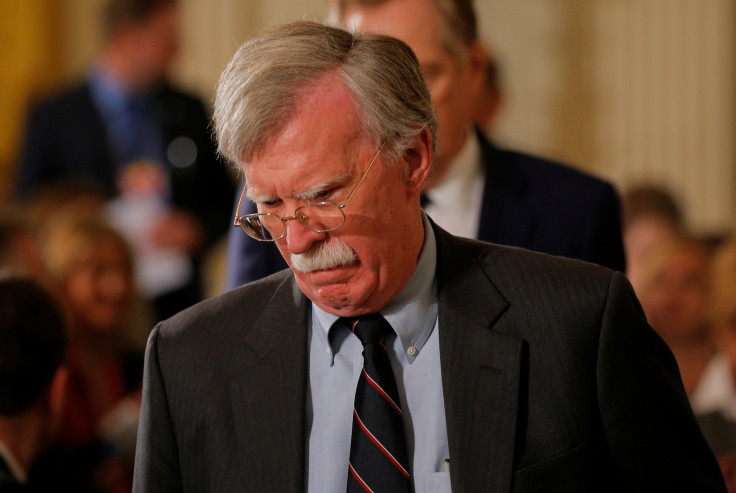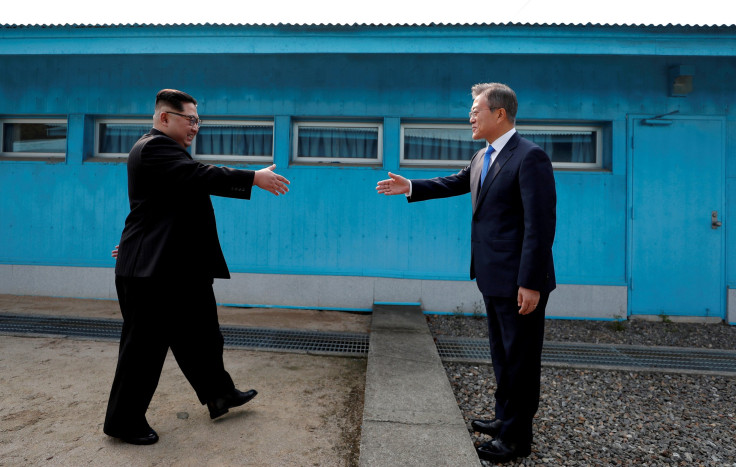North Korea Blames John Bolton’s ‘Libya Model’ For Threatening Summit With Trump
Just days after President Donald Trump announced the date and venue (June 12, Singapore) for the historic meeting between the leaders of the United States and North Korea, the East Asian country said Wednesday it would reconsider the summit. Specifically, DPRK blamed Trump’s National Security Advisor John Bolton and his “Libya model” for the country’s denuclearization as factors for reconsidering the summit between Trump and Kim Jong Un.
Bolton, a known North Korea and Iran hawk, was speaking April 29 during an interview on CBS’ “Face the Nation” when he said the U.S. was “looking at the Libya model of 2003, 2004” for North Korea to give up its nuclear weapons. Libya’s leader Muammar Gaddafi allowed inspectors into his country’s weapons facilities, but in 2011, U.S. and NATO forces backed an uprising against Gaddafi, which ended with him being dragged out into the streets before being killed.
In its statement, North Korea said such talk by Bolton was “not an expression of intention to address the issue through dialogue. It is essentially a manifestation of awfully sinister move to impose on our dignified state the destiny of Libya or Iraq which had been collapsed due to yielding the whole of their countries to big powers.”

The statement, attributed to first vice-minister of foreign affairs for DPRK, Kim Kye Gwan, also said the country wasn’t looking for or expecting any economic aid from the U.S. in exchange for giving up its nuclear arsenal, if it chose to do so, and called the Trump administration’s pressure tactics “a ridiculous comedy.”
“We have already stated our intention for denuclearization of the Korean peninsula and made clear on several occasions that precondition for denuclearization is to put an end to anti-DPRK hostile policy and nuclear threats and blackmail of the United States. But now, the U.S. is miscalculating the magnanimity and broad-minded initiatives of the DPRK as signs of weakness and trying to embellish and advertise as if these are the product of its sanctions and pressure,” the statement said.
These comments from North Korea come just a day after its ambassador to Switzerland, Han Tae Song, told a United Nations disarmament conference in Geneva the country would join global efforts to end nuclear weapons testing. A few days ago, the country had also invited officials from South Korea and the U.S. to watch the closing down of its nuclear weapons facilities.
Before Wednesday’s statement was issued, North Korea had also cancelled talks with South Korea to be held the same day, citing the ongoing joint U.S.-South Korea military drills in the area. On Tuesday, the two sides had announced lists of high-level officials who would participate in the Wednesday talks.

At the historic meeting between Kim Jong Un and South Korean President Moon Jae-in on April 27 in the border village of Panjunmon, the two sides agreed, among other things, to halt all hostile acts against each other. North Korea may be considering the military drills with the U.S. a hostile act.
According to a report by South Korea’s Yonhap News Agency, Secretary of State Mike Pompeo, who met Kim twice in recent weeks, said the U.S. was continuing with preparations for the June 12 summit in Singapore, while watching out for further reactions from North Korea.
“If the U.S. is trying to drive us into a corner to force our unilateral nuclear abandonment, we will no longer be interested in such dialogue and cannot but reconsider our proceeding to the DPRK-U.S. summit,” the North Korean statement concluded.
Commenting on the statement by North Korea, Anwita Basu from the Economist Intelligence Unit told IBT the regime could be getting nervous about its commitment to the summit with Trump, struggling to justify to its population the sudden rapprochement with the U.S.
“From a diplomatic standpoint, the parties that will lose the most if the US-North Korea talks fall through would be South Korea and China. Both countries are eager to support the North Korean economy and diffuse the tensions around the nuclear programme through diplomacy and negotiation. With hawkish players leading the US administration and extreme distrust in North Korea, such hopes might be quickly quashed,” Basu added.
The story has been updated to add the comments from Economist Intelligence Unit.
© Copyright IBTimes 2024. All rights reserved.




















